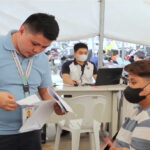The Department of Social Welfare and Development’s (DSWD) Project LAWA (Local Adaptation to Water Access) and BINHI (Breaking Insufficiency through Nutritious Harvest for the Impoverished) has been nominated in the United Nations (UN) Sasakawa Award for Disaster Risk Reduction.
Asst. Secretary Irene Dumlao of the DSWD’s Disaster Response Management Group (DRMG) said on Monday (March 31) it is an honor for the DSWD to receive the nomination for the prestigious award from the UN World Food Programme (WFP).
“The Department is honored to receive a nomination for such a prestigious award. As the lead disaster response agency, the DSWD addresses the needs of families and individuals who are affected by sudden disasters. While doing so, we are also mitigating the impacts of slow-onset disasters through the implementation of the Project LAWA and BINHI,” Asst. Secretary Dumlao, who is also the DSWD’s spokesperson, said.
Since the project’s launch in 2023, a total of 1,932 LAWA sites or water reservoirs were able to cater to more than 7,234 hectares of agricultural land by providing irrigation and water support to target communities.
Asst. Secretary Dumlao said the WFP nomination is a product of the whole-of-nation collaboration between different stakeholders, the national government, local government, community-based organizations, and down to the beneficiaries themselves.
“This partnership is what makes the Project LAWA and BINHI one of the biggest climate mitigation and adaptation programs in the country, benefitting more than 140,000 households,” the DSWD spokesperson said.
The Project LAWA and BINHI is geared towards climate change mitigation and risk resiliency. It lessens the economic vulnerability of marginalized communities through the creation of small farm reservoirs that serve as water harvesting facilities and the establishment of communal diversified integrated farming systems to promote sustainable agricultural practices across the nation.
“Projects LAWA and BINHI are designed to lessen the impacts of food insecurity and water scarcity caused by the El Niño while managing excess water during periods of heavy rainfall associated with the La Niña,” Asst. Secretary Dumlao explained.
A total of 4,317 BINHI sites or gardening projects were also established in the same period, yielding 21,024,130 kilos of produce that helped feed more than 876,200 individuals.
The United Nations Sasakawa Award for Disaster Risk Reduction is awarded to an individual or institution that has made active efforts to reduce disaster risk in their community and advocates for resilience. (AKDL)


